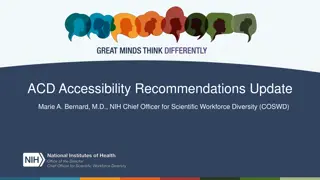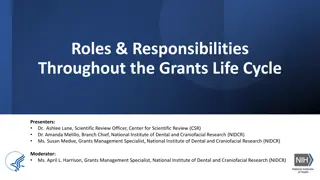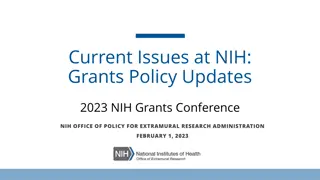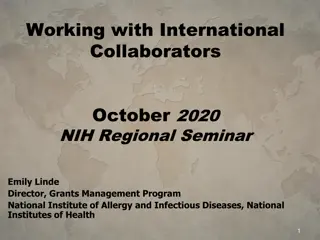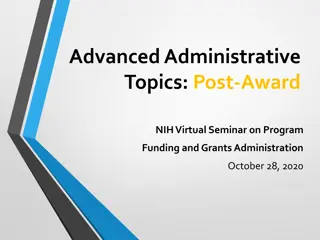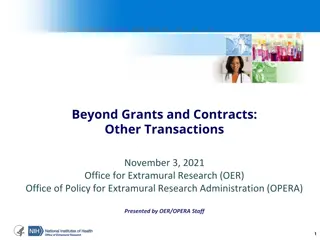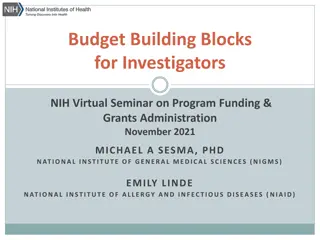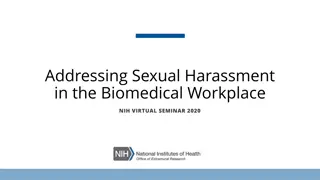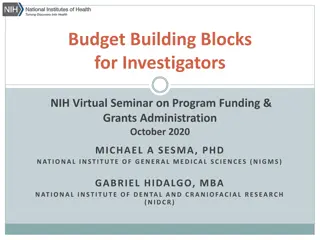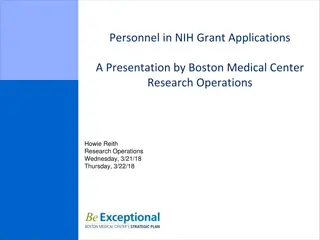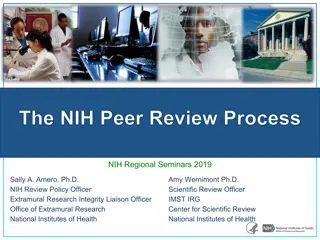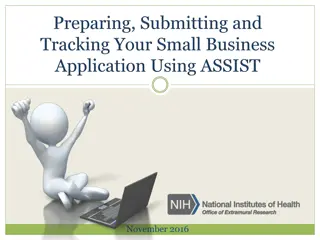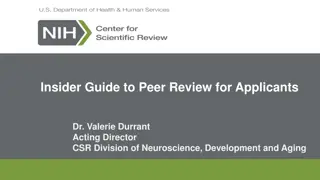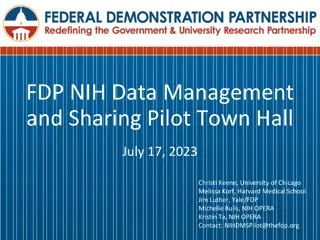Understanding Challenges in Pre-Award Administration at NIH
Explore the complexities of pre-award issues in NIH grants administration, including factors such as human subjects research, multiple collaborating institutions, and policy changes. Gain insights on thinking like a federal agency and navigating the diverse funding institutes to make informed decisions in challenging situations.
Download Presentation

Please find below an Image/Link to download the presentation.
The content on the website is provided AS IS for your information and personal use only. It may not be sold, licensed, or shared on other websites without obtaining consent from the author. Download presentation by click this link. If you encounter any issues during the download, it is possible that the publisher has removed the file from their server.
E N D
Presentation Transcript
Advanced Administrative Topics: Pre-Award NIH Virtual Seminar on Program Funding and Grants Administration October 27, 2020
Presenters Crystal Wolfrey Chief Grants Management Officer National Cancer Institute **************************** Sean Hine Branch Chief National Cancer Institute **************************** Special Guest: Terri Jarosik Chief Grants Management Officer National Institute of Mental Health 2
Quick logistics You are all muted with no video You are welcome to put questions in the Q&A however This session relies heavily on case studies real-life examples of issues that have occurred We will be trying to cover a number of topics directly and indirectly - throughout We will most likely not have ample time to cover Q&A but we have some plans Take advantage of the numerous Q&A sessions set up at each IC booth!
What Are Some Aspects that Make Projects Complex and Create Pre- Award Issues? Human subjects research Clinical trials research PIs with multiple NIH awards Multiple collaborating institutions and/or PIs Changes prior to award Over-arching policy changes 4
Thinking Like a Fed: First, Remember NIH Is a Federal Agency Must support federal policy, to enforce applicable laws, cost principles and administrative requirements Must support President's initiatives and policies. Stewards of federal funds 5
Thinking Like a Fed: Second, the 24 Funding Institutes/Centers (IC s) Are Very Different Some IC s have a relatively broad mission; others are (by comparison) relatively narrow Larger IC s have more funds which can mean more flexibilities Not all IC s fund the same grant mechanisms 6
NIH Perspective When Considering Challenging Complex Situations During Pre-Award Factors we consider critical in making decisions in 'tough' situations: Have we "listened" enough to really understand all the issues and objectives of the situation? What is best from a scientific or programmatic perspective (how will this impact the original scope/aims of the project)? What will best serve the investment of the taxpayer in the project? Could the action create issues unintended consequences? For example - protection of human subjects concerns? 7
NIH Perspective: Additional Considerations Additional considerations we consider in making decisions in 'tough' situations: Will an action create a precedent which will limit flexibility in the future? Is an action consistent with NIH, HHS or other Federal policy? Do we have the necessary funds to support the proposed arrangements? How would this play if presented on the evening news or the front page of ......? 8
Questions We Ask When Considering Challenging Complex Situations What is in the best interest of the science? What is in the best interest of the recipient? What is in the best interests of the PI(s)? Is there an opportunity for a 'win/win'? 9
Situations we will explore involving Other Support Human subjects research and safety NIH initiatives to enhance clinical trial stewardship and human subjects research Changes prior to award 10
Other Support Applicant organizations are responsible for submission of complete and accurate information in Just-In-Time (JIT). This includes other sources of support NIH relies on the accuracy of that information in making funding decisions Has received a particular focus as of late with a lot of clarity on what is to be included Time/effort commitment Overlap All sources of support regardless of whether funds are provided Include all pending support at the time of the JIT submission See the NIH Grants Policy Statement Section 2.5.1 and NIH Guide Notice: NOT-OD-19-114 11
Time to paint a picture Competing grant A with Dr. Dicey is submitted in June, 2017. It receives a good score 3rd percentile. Meets the NIH awarding IC s funding policies in FY2018 funded as a part of the January council in 2018
And then A second competing grant from Dr. Dicey is then submitted in October 2017 receives a good score at the 4th percentile Meets the NIH awarding IC s funding policies in FY2018 funded as a part of the May council in 2018
Lets fast forward to FY2020. We are going to listen in on a call between the NIH Program Official and the NIH Grants Management Specialist Ummm
And Now Let s listen into the call between NIH Officials and the Grant Recipient
What happened? The recipient organization provided: A statement acknowledging the overlap and the oversight in the Other Support The more recent grant was relinquished The Other Support review procedures were edited to include additional requirements as well as the template updated to require all information as stated in NIH policy The NIH IC: Revised the award to end the grant Retained the updated policies for that institution
Sowhat have we learned here? It is crucial (and required!) that all information is completely up to date and accurate If something is missed on the applicant/recipient side, address it sooner than later Even if the situation gets through there are actions that can be taken even after the fact
Human Protection and Safety A competing grant is proposing two studies and is trying to submit JIT. Study A has received IRB approval while Study B does not. Both studies are fully described in the application. Study B will not actually begin until later in the project period. What can be done? ENTER YOUR ANSWER IN THE CHAT A The applicant should not submit JIT until it has both approvals the award will wait until all is in place. B The applicant should consider removing the study with the pending IRB contact the Program Official to discuss further. C Send in the JIT with the one IRB approval and a statement on the other study. The award can be considered a delayed onset situation and issued with a restriction. D Send in the JIT with the one IRB approval and a statement on the other study. The award can be considered a delayed start situation and issued with a restriction. 19
The Answer: A competing grant is proposing two studies and is trying to submit JIT. Study A has received IRB approval while Study B does not. Both studies are fully described in the application. Study B will not actually begin until later in the project period. What can be done? A The applicant should not submit JIT until it has both approvals the award will wait until all is in place. B The applicant should consider removing the study with the pending IRB contact the Program Official to discuss further. C Send in the JIT with the one IRB approval and a statement on the other study. The award can be considered a delayed onset situation and issued with a restriction. D Send in the JIT with the one IRB approval and a statement on the other study. The award can be considered a delayed start situation and issued with a restriction.
What is wrong with answer A? The applicant should not submit JIT until it has both approvals the award will wait until all is in place. There is absolutely no reason to wait on this situation Waiting simply delays the award and research that is ready to start Key - Communicate to the NIH IC as to what is going on so we can help guide you through options
Why is wrong with Answer B? The applicant should consider removing the study with the pending IRB contact the Program Official to discuss further. The dropping of a study could dramatically change the application s scope This could result in the grant s score being reconsidered
What is wrong with Answer C? Send in the JIT with the one IRB approval and a statement on the other study. The award can be considered a delayed onset situation and issued with a restriction. Delayed Onset: Research is anticipated within the period of award, BUT definite plans are not yet known and cannot be described in the application. In this case, the plans are known and detailed in the application they just aren t planned to start until a later year
Why Answer D? Send in the JIT with the one IRB approval and a statement on the other study. The award can be considered a delayed start situation and issued with a restriction. Delayed Start: Research plans can be described at time of application, but research will not immediately begin (will occur later in the funding period) In this case, the application provides the plans for human subjects research. The timeline also details when the study is anticipated to begin The NIH IC can proceed with an award and include a restriction on the human subjects research for this study until IRB approval is obtained, submitted and approved by the IC.
Delayed Onset 3 Categories Delayed Onset awards generally fall into one of three broad categories: Single project awards (research grants, career development awards or fellowships) in which results from initial pre-clinical research are needed before the human subjects research can be fully planned. Clinical research networks or consortia often funded as cooperative agreements or multi-project awards, that plan to add new protocols over the course of the award. Award mechanisms that include funds for small projects that will be selected and funded by the awardee. These are often referred to as pilot project programs and may be used to support new or junior faculty or to stimulate new research areas at the awardee institution and its collaborators. https://grants.nih.gov/grants/guide/notice-files/NOT-OD-15-129.html 26
Delayed Onset While the PI is conducting the pre-clinical studies, NIH will issue the award indicating that no human subject activities should be initiated in the study until their involvement can be fully described. This restriction will allow the release of award funds and allow the PI to start working without the need for an FWA or IRB review and approval. Once the PI is prepared to begin research involving human subjects, the PI must submit to the IC the completed Protection of Human Subjects section, the FWA number, the IRB approval date and documentation of human subjects education by the key personnel. 27
Key Difference in the Awards Because the application did not include definite plans for human subjects research NIH must review and approve those plans post award. Awardees must submit a new or revised human subjects section that clearly describes risk, protections, benefits and importance of the knowledge to be gained by the revised or new activities. The initiation of the human subjects research requires NIH prior approval if not approved the award would require renegotiation or phase-out.
Lightning Round Q&A For the next 5 minutes, we will address as many questions as we can If they are too involved, we may need to skip it. However, please feel free to contact us via e-mail (or attend one of the many Meet the Expert sessions!)
Changes Prior to Award There are approximately nine months between the submission of an application and the NIH making an award. In those nine months things can change PI s move, get new jobs, plans change. 30
Purely Hypothetical Situation The PI on an application that has been reviewed but not awarded has moved to a non-US organization and wants to take the grant with him/her. IS THIS EVEN POSSIBLE?? Enter Yes or No in the Chat 31
Can a grant transfer prior to award to a foreign organization? Yes .but it is complicated Needs to be permitted by the Funding Opportunity Announcement Grant still needs to be relinquished by the original applicant Prior approval requirement change of recipient organization AND adding a foreign component Need to consider the scope of the originally submitted application Must go to the IC s Council for review and approval The above is considered prior to a competing award being made or during the middle of a project period It can take a while so sooner it is known, the better to start discussing
Purely Hypothetical Situation Institution A has submitted a multi-PI application. One of the PIs was located at a subawardee institution. When NIH contacts you to negotiate an award, the Contact PI tells you that the other PI has left his organization and is now working at an NIH Institute. Here is what that conversation could sound like 33
New Applicant Additional Considerations NIH is required to assess not only the merit of the application but also to consider the ability of the applicant to manage the grant funds Main items that would be considered: Financial management standards policies, audits Will request financial records to assess capital ratio Documentation on the organizational structure Other policies and procedures that may be dictated based on the nature of the grant application All other requirements for NIH applications would still apply
Communication Between Department and Sponsored Projects Is Critical Many solutions are organizationally culture- driven. For example, if good communication is part of the culture, then it is more likely to support good management practices, such as work groups across departmental boundaries. Current, written, accessible policies and procedures are a must. All parties involved must know, understand and comply with the rules, policies guidelines. If not, well outcomes are not likely to be positive. 35
Resources I. Your Organization Sponsored Programs Office Accounting Office Internal Auditor IRBs IACUCs II. NIH Grants Management Specialist Program Administrator Office of Laboratory Animal Welfare (OLAW) http://grants.nih.gov/grants/olaw/olaw.htm Office of Financial Management http://ofm.od.nih.gov Grants Policy & Guidance http://grants.nih.gov/grants/policy/policy.htm III. DHHS Office for Human Research Protections (OHRP) 36
Resources for Compliance Tips, methods, what to do? So many resources, only a select few are named here. NIH Grants Compliance and Oversight website has compendium of observations, and presentations http://grants.nih.gov/grants/compliance/compliance.htm NIH Grants Compliance Inbox grantscompliance@mail.nih.gov NIH Outreach Activities http://grants.nih.gov/grants/outreach.htm 37 37
Select Resources at the NIH Grants Management Specialist on the Notice of Award or in eRA; as backup contact the Chief GMO of IC: http://grants.nih.gov/grants/stafflist_gmos.htm Program Official on the Notice of Award Office of Extramural Research: http://grants.nih.gov/grants/oer.htm NIH Grants Information: http://grants.nih.gov/grants/giwelcome.htm NIH Grants Policy Inbox (policy questions not specific to the NoA): grantspolicy@mail.nih.gov Division of Financial Advisory Services: http://oamp.od.nih.gov/dfas 38
Questions?? Feel free to contact us via e-mail: Crystal Wolfrey - crystal.wolfrey@nih.gov Sean Hine sean.hine@nih.gov Terri terri.jarosik@nih.gov 39
We have a few minutes Bring on the questions!! Enter your questions in the Q&A and we will address what we can!
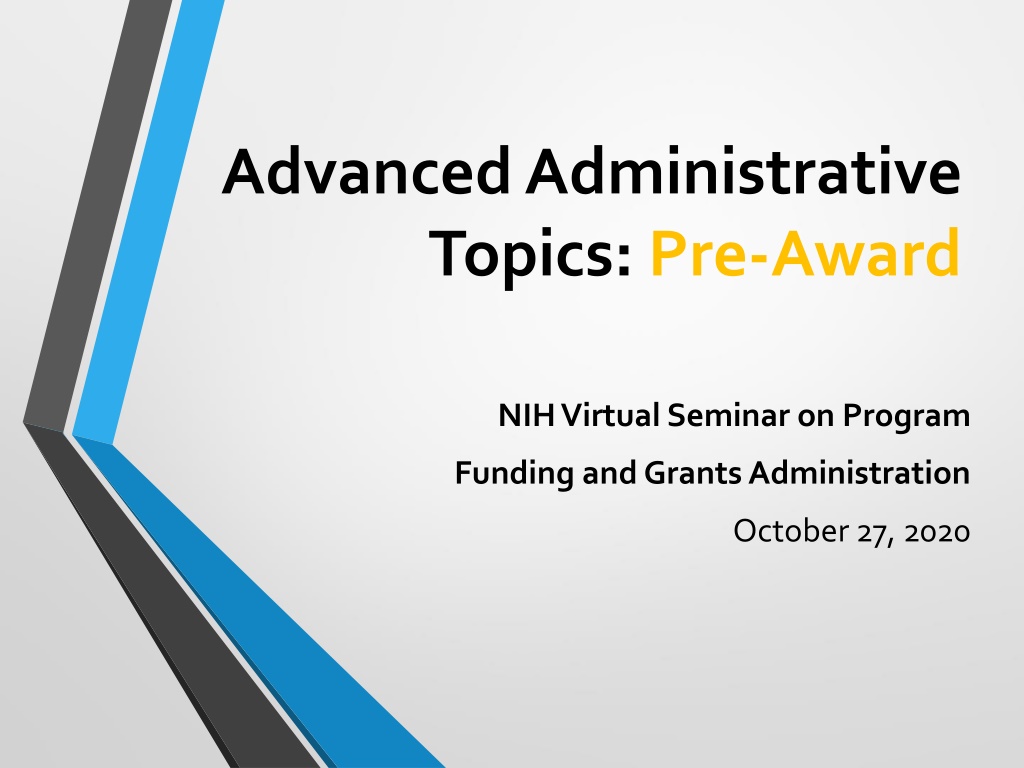
 undefined
undefined









